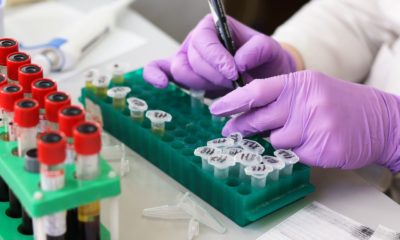Biotech
Tractivus seeks 2.3 million to carry out the clinical validation of its technology
The Spanish company Tractivus, specialized in developing antibacterial coatings, is completing the industrial validation and will use the funds to carry out the preclinical and clinical phase. Tractivus is negotiating with an industrial partner to start the financing round. The Tractivus operation has generated interest among its current investors, mostly business angels.

Tractivus is looking for $2.8 million (€2.3 million) to carry out the clinical validation of its technology. The company, which specializes in developing antibacterial coatings, will use the funds to carry out both the preclinical and clinical phases. The company will open a funding round, the company’s third, in the coming weeks.
Read more details about Tractivus and its latest financing round with the Born2Invest mobile app. Our companion app brings you the latest business news in the world so you can stay informed.
Tractivus is finalizing the industrial validation phase
The co-founder and CEO of Tractivus, Joan Gilabert, explained that “we are negotiating with an industrial partner to launch the round with part of the amount committed.” The startup, based in Barcelona, is finalizing the industrial validation stage to have its product ready. The company is developing a technology to avoid infections after the implantation of medical devices. Gilabert points out that the company will use the funds to carry out preclinical and clinical validation and to design the industrialization process.
Tractivus is negotiating with an industrial partner to start the financing round. The Tractivus operation has generated interest among its current investors, mostly business angels. In addition, the company’s CEO assures that “we have contact with European and Asian companies and also American investors”. This is the third round of financing for the start up after capturing 200,000 euros and 430,000 euros of private capital in two previous rounds. Another of the company’s objectives is for a device manufacturer interested in buying the Tractivus license to participate in this operation.
Tractivus technology will be sold after it will be licensed
The company will license its technology and sell it so that manufacturers with a broad product portfolio can implement it in a greater number of devices. Currently, 85 million people a year are infected by prosthetic implants in the United States and Europe. This pathology is the fourth cause of death in the United States and the only element that eliminates the symptoms, but not the infection, is the antibiotic.
Tractivus technology might be commercialized as soon as the end of 2022
The company plans to begin commercializing its technology at the end of 2022 and make the leap to the United States two years later. It is predicted that up to ten million people worldwide will die from these infections in 2050.
The company expects to close the funding round in the first half of 2021 and hopes to start commercializing its technology between late 2022 and early 2023 in Europe and two years later make the leap to the United States. Tractivus is a spin-off from the Gemat research group (IQS – Ramón Llull University) and Idibell. Since its foundation in 2015, the company has raised $516,000 (€425,000) of public funding through competitive projects. The company currently has five employees. In addition to Gilabert, the other co-founders are Robert Teixidó, director of technology, and Salvador Borrós, head of security.
__
(Featured image by jarmoluk via Pixabay)
DISCLAIMER: This article was written by a third party contributor and does not reflect the opinion of Born2Invest, its management, staff or its associates. Please review our disclaimer for more information.
This article may include forward-looking statements. These forward-looking statements generally are identified by the words “believe,” “project,” “estimate,” “become,” “plan,” “will,” and similar expressions. These forward-looking statements involve known and unknown risks as well as uncertainties, including those discussed in the following cautionary statements and elsewhere in this article and on this site. Although the Company may believe that its expectations are based on reasonable assumptions, the actual results that the Company may achieve may differ materially from any forward-looking statements, which reflect the opinions of the management of the Company only as of the date hereof. Additionally, please make sure to read these important disclosures.
First published in PlantaDoce, a third-party contributor translated and adapted the article from the original. In case of discrepancy, the original will prevail.
Although we made reasonable efforts to provide accurate translations, some parts may be incorrect. Born2Invest assumes no responsibility for errors, omissions or ambiguities in the translations provided on this website. Any person or entity relying on translated content does so at their own risk. Born2Invest is not responsible for losses caused by such reliance on the accuracy or reliability of translated information. If you wish to report an error or inaccuracy in the translation, we encourage you to contact us.

-

 Business1 week ago
Business1 week agoThe TopRanked.io Weekly Digest: What’s Hot in Affiliate Marketing [uMobix Affiliate Program Review]
-

 Business2 weeks ago
Business2 weeks agoThe TopRanked.io Weekly Digest: What’s Hot in Affiliate Marketing [PureVPN Affiliates Review]
-

 Crypto2 days ago
Crypto2 days agoBitcoin Stabilizes Above $120K: Consolidation Signals Before Next Breakout
-

 Crowdfunding1 week ago
Crowdfunding1 week agoPMG Empowers Italian SMEs with Performance Marketing and Investor-Friendly Crowdfunding
























